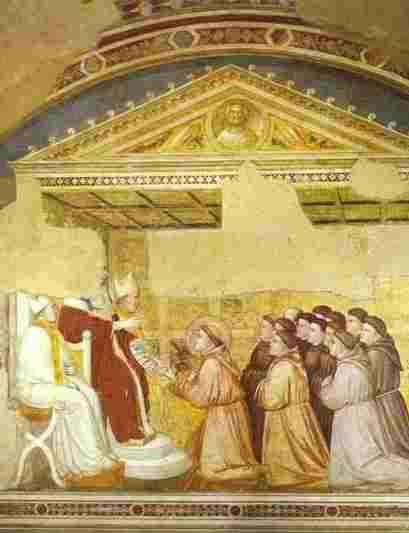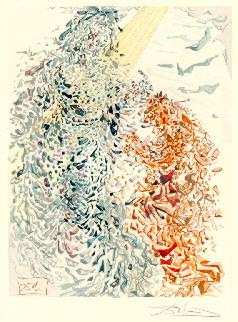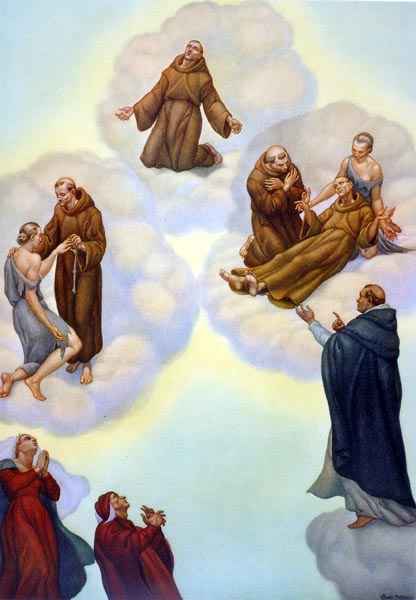 |
 |
 |
|
|
|
|
 |
 |
 |
|
|
|
|
| PAR11 |
|
|
|
|
| ........... | ....... G.GUAITA |
................................. H.W.LONGFELLOW |
...... .D.ALIGHIERI |
....... ... | ....... |
| 1
|
O
vòji
sénsa
séns
ad
vuj murtaj, che ràsa mai 'd razunamént a ién che ' v fan raz a tèra bàti i àli! |
O
Thou insensate care of mortal men, How inconclusive are the syllogisms That make thee beat thy wings in downward flight! One after laws
and one to
aphorisms And one in theft,
and one
in state affairs, |
O
insensata
cura
de'
mortali, quanto son difettivi silogismi quei che ti fanno in basso batter l'ali! |
| 4
|
Chi
près
fè
l'avucàt
e
chi 'l dutùr, chi fè batézim, mësi e füneràj, chi cumandè, 'n poc vulp e 'n poc liòn, |
Chi
dietro a iura,
e chi ad amforismi sen giva, e chi seguendo sacerdozio, e chi regnar per forza o per sofismi, |
|
| 7
|
chi
rubè,
chi
fè
'l
sìndic, l'asesùr, chi tüt anvlüpà 'nti piazì dla carn, i dàva 'ndrén, e chi 'l fàva 'l plandròn; |
e chi
rubare, e chi
civil negozio, chi nel diletto de la carne involto s'affaticava e chi si dava a l'ozio, |
|
| 10
|
méntre
mi,
lìbar
ad
tüti
si mizérji, cun Beatrìs ricevìva la sü 'n cél n'acugliénsa gluriùza da nén dì. |
When
I, from all these things emancipate, With Beatrice above there in the Heavens With such exceeding glory was received! When each one had
returned
unto that point And from within
the effulgence
which at first |
quando,
da tutte
queste cose sciolto, con Beatrice m'era suso in cielo cotanto gloriosamente accolto. |
| 13
|
Quànd
che
ugnün
l'è
truvàsi
'nti cul post dal sèrc' andùa lü a l'éra prìma, 's fèrma a piòmb, mè candéila 'nsal candlè. |
Poi che
ciascuno
fu tornato ne lo punto del cerchio in che avanti s'era, fermossi, come a candellier candelo. |
|
| 16
|
E
mi
iù
santì
andrén
cùla gran lùce che l'àva parlàmi prìma suridénd ancumincè, fazéndsi pü lüzénta: |
E io
senti' dentro
a quella lumera che pria m'avea parlato, sorridendo incominciar, faccendosi più mera: |
|
| 19
|
"Mè
chi
ilüminà
dai
so
rag' i son, cuzì, vardànd an cùla lùce etèrna, la càuza ànche i cunòs di to pensé. |
"Even
as I am kindled in its ray, So, looking into the Eternal Light, The occasion of thy thoughts I apprehend. Thou doubtest,
and wouldst
have me to resift Where just before
I said,
'where well one fattens,' |
«Così
com'io del suo raggio resplendo, sì, riguardando ne la luce etterna, li tuoi pensieri onde cagioni apprendo. |
| 22
|
Ti
t'è
'n
dübi,
e
't völi che tlu spiéga parlànd ant' na manéra ciàra e piàn'a che 't pödi ti capì lònche i dizìva, |
Tu dubbi,
e hai voler
che si ricerna in sì aperta e 'n sì distesa lingua lo dicer mio, ch'al tuo sentir si sterna, |
|
| 25
|
quànd
mi
iù
dit
'andùa
'ngrasè 's pöl', e quànd iù dit 'l'è nén stàini 'n secònd'; e pròpi chi dès vénta che 's distìngua. |
ove
dinanzi dissi
"U' ben s'impingua", e là u' dissi "Non nacque il secondo"; e qui è uopo che ben si distingua. |
|
| 28
|
La
Pruvidénsa
che
guvèrna
'l
mond cun na sapiénsa che 'd cunòsi a fond bòn'a sarìa 'nsün'a creatüra, |
The
Providence, which governeth the world With counsel, wherein all created vision Is vanquished ere it reach unto the bottom, (So that towards
her own
Beloved might go Self-confident
and unto Him
more faithful,) |
La
provedenza, che
governa il mondo con quel consiglio nel quale ogne aspetto creato è vinto pria che vada al fondo, |
| 31
|
parchè
l'andéisa
vèrs
al
so
Amùr la dòna 'd Cul che ad àuta vus criànd, cun al so sang presiùs a l'ha spuzàla, |
però che andasse
ver' lo suo diletto la sposa di colui ch'ad alte grida disposò lei col sangue benedetto, |
|
| 34
|
pü
sicüra
'd
lé
e
a Lü pü fedél, duj prìncip l'ha urdinà par aiütèla che stàndji a fiànc, par bén a lu guidéisu. |
in
sé sicura
e anche a lui più fida, due principi ordinò in suo favore, che quinci e quindi le fosser per guida. |
|
| 37
|
Iün
l'éra
'd
seràfica
carità, e l'àut par sapiénsa l'éra a 'l mond ad cherübica lùce na splendùr. |
The
one was all seraphical in ardour; The other by his wisdom upon earth A splendour was of light cherubical. One will I speak
of, for
of both is spoken Between Tupino
and the stream
that falls |
L'un fu
tutto serafico
in ardore; l'altro per sapienza in terra fue di cherubica luce uno splendore. |
| 40
|
Parlarù
mèc
ad
iün,
parchè
ludànd iün di duj, avénd lur n'ünica mìra, 's finìs cuzì 'd ludèi tüti duj. |
De l'un
dirò,
però che d'amendue si dice l'un pregiando, qual ch'om prende, perch'ad un fine fur l'opere sue. |
|
| 43
|
Tra
'l
fiüm
Tupìn
e
l'àqua che vén giü dal bric cl'è stat sarnì da sant Übàld, na còsta 'd tèra bòn'a a pénd dal mont; |
Intra
Tupino e l'acqua
che discende del colle eletto dal beato Ubaldo, fertile costa d'alto monte pende, |
|
| 46
|
da
lì
Perügia
'l
càud
e 'l frëd la sént da Pòrta Sul; daré Guàldo e Nocéra i piànzu 'nsèma par al grév masìs. |
From
which Perugia feels the cold and heat Through Porta Sole, and behind it weep Gualdo and Nocera their grievous yoke. From out that
slope, there
where it breaketh most Therefore let him
who speaketh
of that place, |
onde
Perugia sente
freddo e caldo da Porta Sole; e di rietro le piange per grave giogo Nocera con Gualdo. |
| 49
|
Di
sa
còsta,
là
'ndùa
la pendénsa l'è mén fòrta, a 'l mond i nas an sul, mè cust dal vòlti 's léva ansìma a 'l Gànge. |
Di questa
costa,
là dov'ella frange più sua rattezza, nacque al mondo un sole, come fa questo tal volta di Gange. |
|
| 52
|
Perciò
chi
'l
völ
parlè
di 's post che i dis, 'l dirìa ciamàndlu Asési, ancù trop poc, 'l duvrìa Uriént ciamèlu prupriamént. |
Però chi d'esso
loco fa parole, non dica Ascesi, ché direbbe corto, ma Oriente, se proprio dir vuole. |
|
| 55
|
L'éra
nén
tant
che
lü
l'éra nasì, che a la tèra fè sénti lü 'l cumìncia 'd cùla so gran virtü' an gran cunfòrt; |
He
was not yet far distant from his rising Before he had begun to make the earth Some comfort from his mighty virtue feel. For he in youth
his father's
wrath incurred And was before
his spiritual
court |
Non era
ancor molto
lontan da l'orto, ch'el cominciò a far sentir la terra de la sua gran virtute alcun conforto; |
| 58
|
ancù
giuvnòt,
a
'l
pàri
l'ha fat guèra par na dòna mal vìsta mè la mort, cùla ch'i arfüdu tüti da piè 'n cà; |
ché per tal
donna, giovinetto, in guerra del padre corse, a cui, come a la morte, la porta del piacer nessun diserra; |
|
| 61
|
e
là,
davànti
al
tribünàl
dal vëscu, 'et còram pàtre' lü l'è ünìsi a lé; e pö bén l'ha vurìi sémp püsè. |
e dinanzi
a la sua
spirital corte et coram patre le si fece unito; poscia di dì in dì l'amò più forte. |
|
| 64
|
Rastà
cùsta
vìdua
dal
prim
om, par pü 'd milasént ani fìn'a a cust, lasà da part, vulì l'éra da 'nsün; |
She,
reft of her first husband, scorned, obscure, One thousand and one hundred years and more, Waited without a suitor till he came. Naught it availed
to hear,
that with Amyclas Naught it availed
being constant
and undaunted, |
Questa,
privata del
primo marito, millecent'anni e più dispetta e scura fino a costui si stette sanza invito; |
| 67
|
né
l'è
valìi
che
'n
cà d' Amiclàte, l'éisa nén spuantàla 'l son dla vus, che l'àva fat pagüra a tüt al mond: |
né
valse udir
che la trovò sicura con Amiclate, al suon de la sua voce, colui ch'a tutto 'l mondo fé paura; |
|
| 70
|
né
'l
fat
che
lé
la füisa curagiùza, tant, che méntre Marìa rèsta giü, lé 'nsèma l'è pianzìi là 'nsla crus. |
né
valse esser
costante né feroce, sì che, dove Maria rimase giuso, ella con Cristo pianse in su la croce. |
|
| 73
|
Par
èsi
püsè
ciàr
antal
parlè, Francèscu e Puvertà a ién cuj duj che 's völu bén; e adès as capìs méj. |
But
that too darkly I may not proceed, Francis and Poverty for these two lovers Take thou henceforward in my speech diffuse. Their concord and
their joyous
semblances, So much so that
the venerable
Bernard |
Ma
perch'io non proceda
troppo chiuso, Francesco e Povertà per questi amanti prendi oramai nel mio parlar diffuso. |
| 76
|
L'andè
d'acòrdi
e
l'èsi
sémp
cuntént, d' amùr, la manéra mè ca 's vardàvu bütavu a 'n cör dla gént di sant pensé; |
La lor
concordia
e i lor lieti sembianti, amore e maraviglia e dolce sguardo facieno esser cagion di pensier santi; |
|
| 79
|
tant
che
sübit
Bernàrd,
al
veneràbil, al va a pé biùt e a cùla sànta pas al cur après mè 'l füisa già 'n ritàrd. |
tanto che
'l venerabile
Bernardo si scalzò prima, e dietro a tanta pace corse e, correndo, li parve esser tardo. |
|
| 82
|
Richësa
grànda
da
'nsün
nén
cunusüa! Dès Egìdiu va scàus, va scàus Silvèstru, après la spus, tant che la spùza a piàz. |
O
wealth unknown! O veritable good! Giles bares his feet, and bares his feet Sylvester Behind the bridegroom, so doth please the bride! Then goes his way
that father
and that master, Nor cowardice of
heart weighed
down his brow |
Oh ignota
ricchezza!
oh ben ferace! Scalzasi Egidio, scalzasi Silvestro dietro a lo sposo, sì la sposa piace. |
| 85
|
E
pö
snu
va
cul
pàri e cul maèstru cun la so dòna e cun la so famìja che an ümiltà i purtàvu già ìl curdòn. |
Indi sen
va quel
padre e quel maestro con la sua donna e con quella famiglia che già legava l'umile capestro. |
|
| 88
|
Né
i
fàva
a
lü,
vargògna e nànca géna, che 'l füisa 'l fiö ad Péru Bernardòn, e l'èsi rangià mal tam mè 'n mandìc; |
Né
li gravò
viltà di cuor le ciglia per esser fi' di Pietro Bernardone, né per parer dispetto a maraviglia; |
|
| 91
|
ma
regalmént
al
so
prugèt
sevér l'ha espòst a l' Inucéns che l'ha ànche dàji la prìma apruvasiòn a l'ùrdin so. |
But
regally his hard determination To Innocent he opened, and from him Received the primal seal upon his Order. After the people
mendicant
increased Incoronated with
a second
crown |
ma
regalmente sua
dura intenzione ad Innocenzio aperse, e da lui ebbe primo sigillo a sua religione. |
| 94
|
Pö
quànd
che
la
gént
pòvra l'è carsüa après a lü, dëgn pü che da i frà 'n tèra d'èsi 'n còro, daj àngiai cantà 'n cél, |
Poi che
la gente
poverella crebbe dietro a costui, la cui mirabil vita meglio in gloria del ciel si canterebbe, |
|
| 97
|
'd
na
secònda
curòn'a
'ncurunà l'è stàta par Onòriu 'd la Spìrit Sant la vòja sànta 'd cul archimandrìta. |
di
seconda corona
redimita fu per Onorio da l'Etterno Spiro la santa voglia d'esto archimandrita. |
|
| 100
|
E
dop
che
dal
martìriu
l'ha avü' séj, an prezénsa dal Suldàn cuzì süpèrba, Crìstu l'ha predicà e i so apòstui; |
And
when he had, through thirst of martyrdom, In the proud presence of the Sultan preached Christ and the others who came after him, And, finding for
conversion
too unripe On the rude rock
'twixt Tiber
and the Arno |
E poi
che, per la
sete del martiro, ne la presenza del Soldan superba predicò Cristo e li altri che 'l seguiro, |
| 103
|
e
par
la
cunversiòn
truvànd
trop zèrba ancù la gént, par nén stè lì fè niénte, l'è turnà ai früt sicür dl'Itàlia sùa, |
e per
trovare a conversione
acerba troppo la gente e per non stare indarno, redissi al frutto de l'italica erba, |
|
| 106
|
tra
'l Tévere e l'Arno là an mès ai roc,
da Crìstu, 'n fin, ia stìgmati l'ha pià, che 'nsal so corp duj àni l'ha purtà. |
nel crudo
sasso intra
Tevero e Arno da Cristo prese l'ultimo sigillo, che le sue membra due anni portarno. |
|
| 109
|
Quànd
a
cul
che
l'àva
dutàlu tant, l'è zmiài bén 'd ciamèlu sü a piè 'l prémi da lü a fè 'l pilìzu merità, |
When
He, who chose him unto so much good, Was pleased to draw him up to the reward That he had merited by being lowly, Unto his friars,
as to the
rightful heirs, And from her
bosom the illustrious
soul |
Quando a
colui ch'a
tanto ben sortillo piacque di trarlo suso a la mercede ch'el meritò nel suo farsi pusillo, |
| 112
|
ai
so
cumpàgn
mè
'l
füisa 'n testamént, la so dòna pü càra ai dà 'n cunsëgna, e d'èsi sémp fedél ai racumànda; |
a' frati
suoi, sì
com'a giuste rede, raccomandò la donna sua più cara, e comandò che l'amassero a fede; |
|
| 115
|
e
da
'n
fàuda
a
lé, cul'ànima bèla, l'ha vulü' turnè 'n cél, antal so rëgn, e 'nsün'a bàra al corp, se nén la tèra. |
e del suo
grembo
l'anima preclara mover si volle, tornando al suo regno, e al suo corpo non volle altra bara. |
|
| 118
|
Pénsa
dès
ti
quàl
mérit
l'ha avü' 'l so dëgn culéga a guidè bén la bàrca 'd san Péru e a tén'i 'n mar la rùta giüsta; |
Think
now what man was he, who was a fit Companion over the high seas to keep The bark of Peter to its proper bearings. And this man was
our Patriarch;
hence whoever But for new
pasturage his
flock has grown |
Pensa
oramai qual
fu colui che degno collega fu a mantener la barca di Pietro in alto mar per dritto segno; |
| 121
|
cust
l'è
stàta
par
nuj
al patriàrca; adès 't pöli capì che chi i va près a lònche 'l dis, bòn'i pruvìsti 'l fa. |
e questo
fu il nostro
patriarca; per che qual segue lui, com'el comanda, discerner puoi che buone merce carca. |
|
| 124
|
Ma
la
so
màndria
ancö,
d'àuti vivàndi la va 'n cèrca e càpita,'s pöl capì, che sa zbërgiàira tant luntàn da lü; |
Ma 'l suo
pecuglio
di nova vivanda è fatto ghiotto, sì ch'esser non puote che per diversi salti non si spanda; |
|
| 127
|
e
püsè
che
i
so
bëru sa zluntàn'u, e i van giruvagànd da chi e da là, l'è ciàr che i tùrnu 'n stàbi sénsa lat,. |
And
in proportion as his sheep remote And vagabond go farther off from him, More void of milk return they to the fold. Verily some there
are that
fear a hurt, Now if my
utterance be not
indistinct, |
e quanto
le sue pecore
remote e vagabunde più da esso vanno, più tornano a l'ovil di latte vòte. |
| 130
|
Anche
ni
è
'd
cuj
che avénd pagüra 'd pèrdsi, ia stan tacà 'l pastùr; ma ién trop rar, e bàsta pòca stòfa par vistìi. |
Ben son
di quelle
che temono 'l danno e stringonsi al pastor; ma son sì poche, che le cappe fornisce poco panno. |
|
| 133
|
Adès
se
i
me
paròli
a ién nén scüri, se ti atensiòn t' è fat a lònch' iù dìti, e ti tlu 'rciàmi bén a la to mént, |
Or,
se le mie
parole non son fioche, se la tua audienza è stata attenta, se ciò ch'è detto a la mente revoche, |
|
| 136 | at
sarè
sudisfàt
alménu
'n
part, parchè 't vidrè che tàpli a pèrd la piànta, e 't vidrè che völ dì la curesiòn: |
In
part contented shall thy wishes be; For thou shalt see the plant that's chipped away, And the rebuke that lieth in the words, 'Where well one fattens, if he strayeth not.'" |
in
parte fia
la tua voglia contenta, perché vedrai la pianta onde si scheggia, e vedra' il corrègger che argomenta |
| 139 | 'andùa s'ingràsa se 's fa nén al fol'. | "U' ben s'impingua, se non si vaneggia"». |